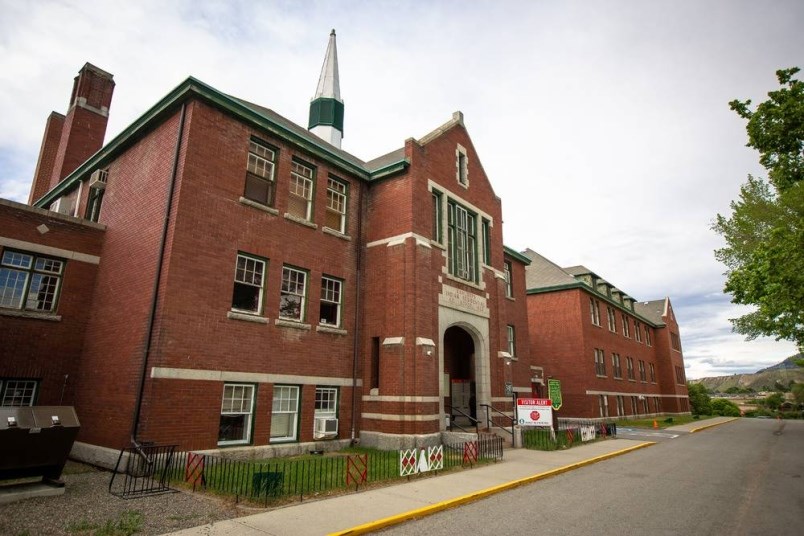On 27 May 2021 the Tk’emlups te Secwépemc First Nation announced the discovery of 215 unmarked graves at the Kamloops Indian Residential School. This announcement spurred on work already being conducted at a number Indian residential school sites across Canada attempting to find unmarked graves. And even though a 50-meter banner had already been unveiled in 2019 containing the names of 2,800 students who had died while attending these institutions, many people were caught by surprise.
For some it brought into perspective the Indigenous experience in Canada and promoted positive change. Others, however, took it upon themselves to argue that it was fake news and/or that Indian residential schools were not designed to rob Indigenous children of their language and culture. Indeed, just as the German documentary Theresienstadt used smiling Jews in 1944 to try to disprove the horrors of the Holocaust, The Dorchester Review posted Indigenous children on a slide in June to try to prove children were happy at Indian residential schools.
It apparently did not matter to them that Sir John A. MacDonald said the goal was assimilation when he implemented the system in 1880s. He was clearly lying, just like the vast majority of Canadian historians who released a statement on 30 June 2021 stating the treatment of Indigenous peoples fully warrants the use of the word “genocide.” Nor did it matter that more and more unmarked graves have been found across the country. Still, it should be clear that as time has passed these announcements have not carried the same weight or received the same amount of attention.
The federal government responded to the news and like usual made a mess of things. Phyllis Jack Webstad’s Orange Shirt Day became the statutory National Day for Truth and Reconciliation holiday and while it is great to have another day off, it also means for most people they will not be wearing an orange shirt to school or work on that day. As such, it subverted what started out as a grassroots movement, and all thanks to a prime minister who showed his true feelings about the matter by taking a vacation to Tofino on that day.
That this happened should come as no surprise to anyone aware of the fact that the federal government was at the time fighting a human rights tribunal ruling ordering them to compensate Indigenous children mistreated by child and family services. Actions truly do speak louder than words, and the one remarkable thing about Justin Trudeau is that the other parties keep on losing to him for some inexplicable reason.
Locally the focus was on the Lejac Indian Residential School, an institution infamous among those who study Indian residential schools for the death of four students in 1937 on Fraser Lake. Suddenly people wanted to know what happened, who knew, and how do we move forward? And while some people seemed concerned about protecting the legacy of Bishop Fergus O’Grady and/or their own reputation, for local First Nations the emphasis was on the survivors, their families, and moving forward in a healthy way.
To this end, there was a three-day event at the site in June and currently the search is underway for unmarked graves on the former school grounds. No doubt an announcement will shortly be made and it will be interesting to see how people react, especially with regard to the future of O’Grady Road.
And finally, there is the Pope’s apology to First Nations, Inuit, and Métis delegates on 1 April 2022. Long demanded, it was anti-climactic to many and meaningless to others. Of course, many apologies are. Actions speaker louder than words. It did not help that he only apologized for the role of a number of Catholics. Still, he did describe the abuses that occurred as antithetical to the Gospel, a view officially shared by the churches involved in the system, and he is expected to visit in July, and might even take part in the Lac Ste. Anne Pilgrimage west of Edmonton, an event that regularly draws more than 30,000 participants, most of them Indigenous.
Only time will tell what comes of this visit, or indeed the more recent visit of the Archbishop of Canterbury, but it is clear that the news out of Kamloops in May 2021 changed things.
Will it be for the better?
Daniel Sims is a First Nations Studies professor at UNBC and a member of the Tsay Keh Dene First Nation.


